UNIT 5 THE VALUE OF MONEY Viewing and Talking—Video Time课件(共149张)
文档属性
| 名称 | UNIT 5 THE VALUE OF MONEY Viewing and Talking—Video Time课件(共149张) | 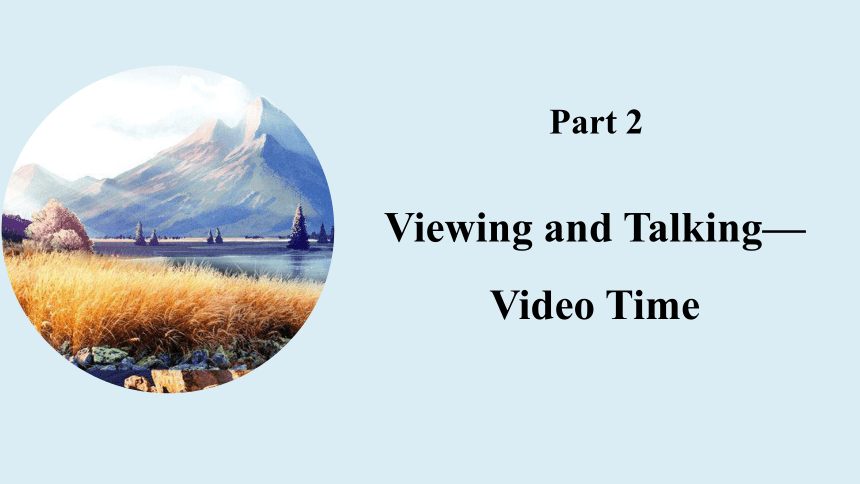 | |
| 格式 | pptx | ||
| 文件大小 | 4.5MB | ||
| 资源类型 | 教案 | ||
| 版本资源 | 人教版(2019) | ||
| 科目 | 英语 | ||
| 更新时间 | 2025-02-16 22:03:05 | ||
图片预览


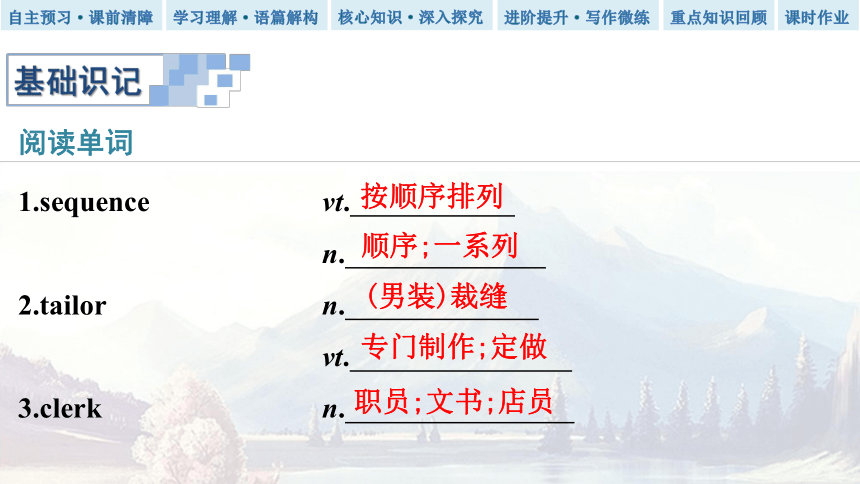
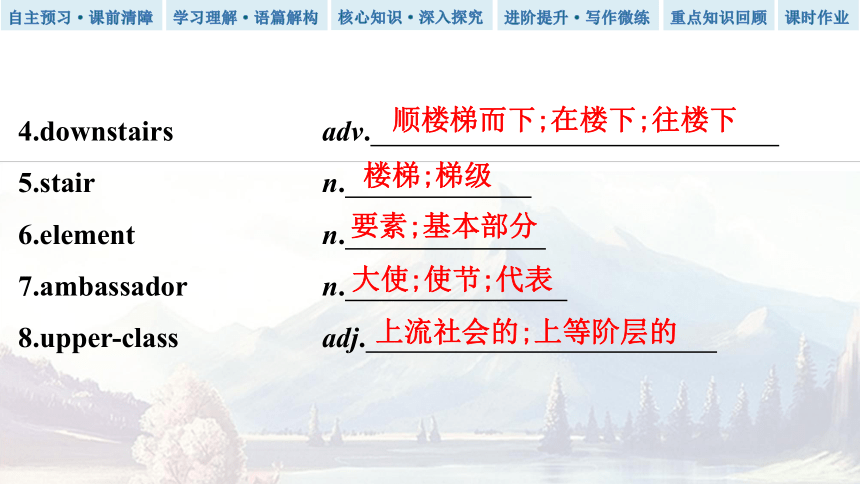
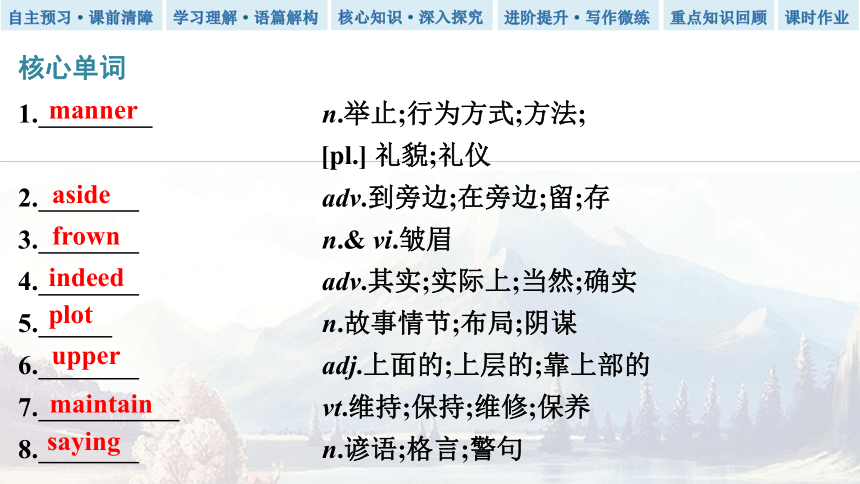
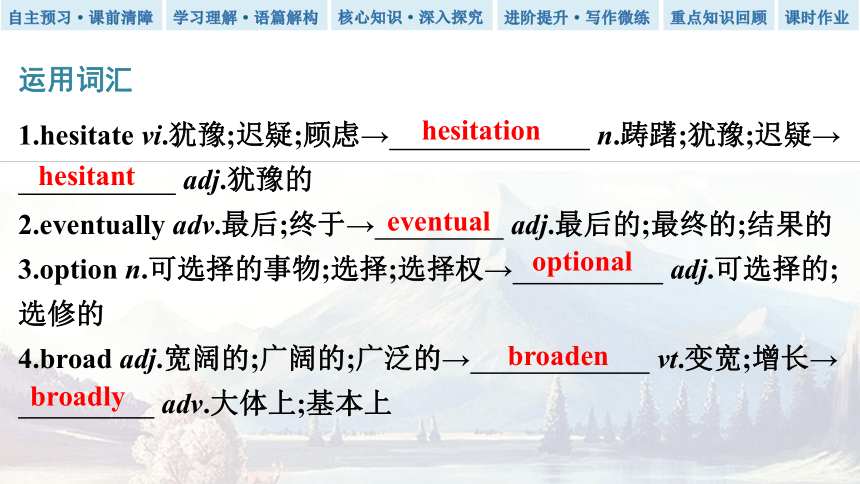
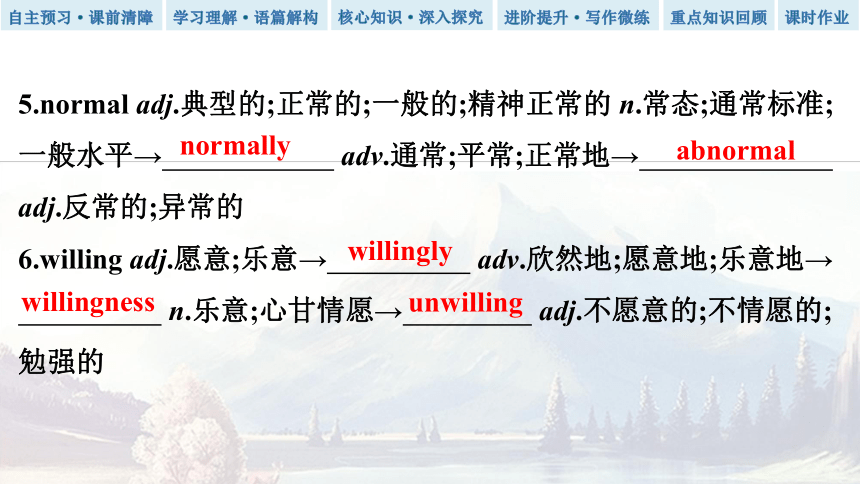
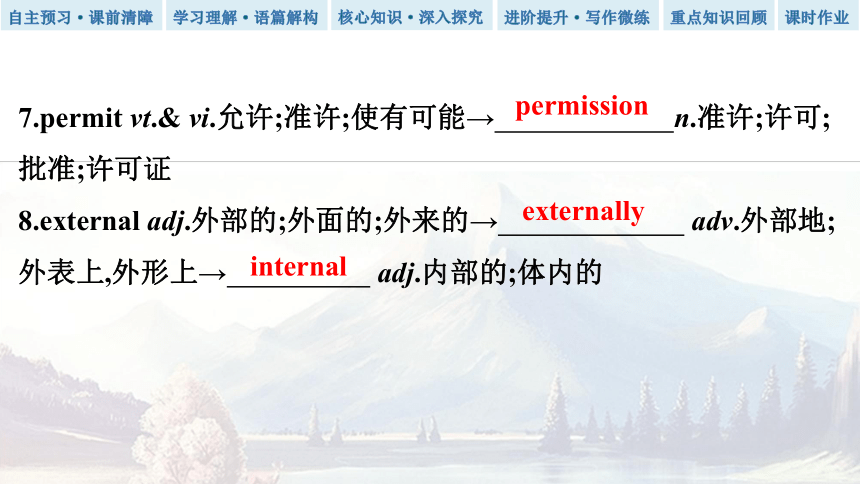


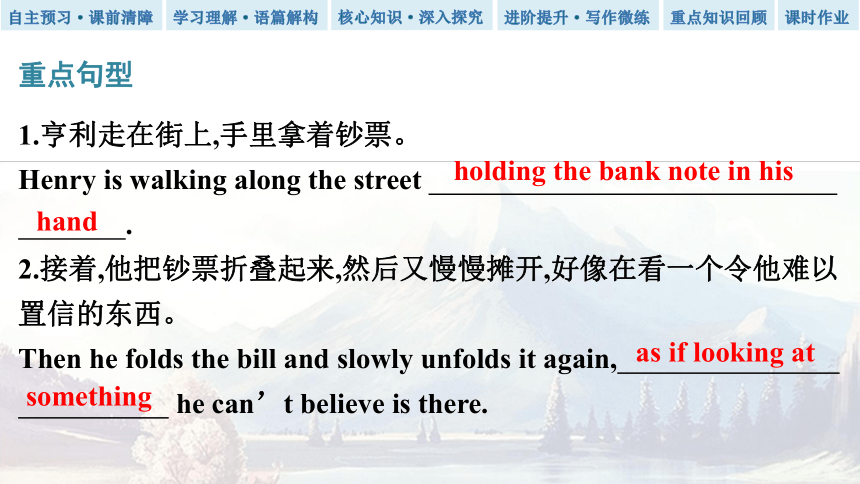
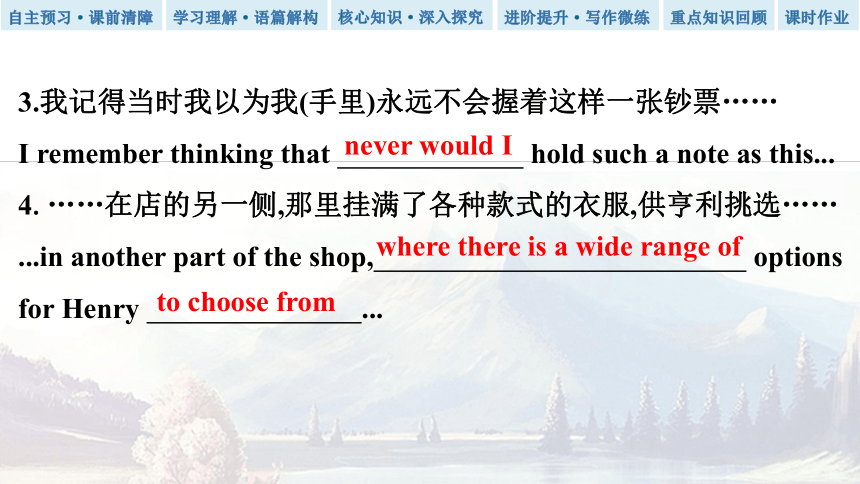
文档简介
(共149张PPT)
Part 2
Viewing and Talking—Video Time
自主预习·课前清障
1.sequence vt.
n.
2.tailor n.
vt.
3.clerk n.
基础识记
阅读单词
按顺序排列
顺序;一系列
(男装)裁缝
专门制作;定做
职员;文书;店员
4.downstairs adv.
5.stair n.
6.element n.
7.ambassador n.
8.upper-class adj.
顺楼梯而下;在楼下;往楼下
楼梯;梯级
要素;基本部分
大使;使节;代表
上流社会的;上等阶层的
核心单词
1. n.举止;行为方式;方法;
[pl.] 礼貌;礼仪
2. adv.到旁边;在旁边;留;存
3. n.& vi.皱眉
4. adv.其实;实际上;当然;确实
5. n.故事情节;布局;阴谋
6. adj.上面的;上层的;靠上部的
7. vt.维持;保持;维修;保养
8. n.谚语;格言;警句
manner
aside
frown
indeed
plot
upper
maintain
saying
运用词汇
1.hesitate vi.犹豫;迟疑;顾虑→ n.踌躇;犹豫;迟疑→
adj.犹豫的
2.eventually adv.最后;终于→ adj.最后的;最终的;结果的
3.option n.可选择的事物;选择;选择权→ adj.可选择的;选修的
4.broad adj.宽阔的;广阔的;广泛的→ vt.变宽;增长→
adv.大体上;基本上
hesitation
hesitant
eventual
optional
broaden
broadly
5.normal adj.典型的;正常的;一般的;精神正常的 n.常态;通常标准;一般水平→ adv.通常;平常;正常地→
adj.反常的;异常的
6.willing adj.愿意;乐意→ adv.欣然地;愿意地;乐意地→
n.乐意;心甘情愿→ adj.不愿意的;不情愿的;勉强的
normally
abnormal
willingly
willingness
unwilling
7.permit vt.& vi.允许;准许;使有可能→ n.准许;许可;批准;许可证
8.external adj.外部的;外面的;外来的→ adv.外部地;外表上,外形上→ adj.内部的;体内的
permission
externally
internal
重点词块及句型
重点词块
1. 犹豫做某事
2. 以一种……的方式;带着一副……的样子
3. 指着
4. 宁愿,宁可(后接动词原形)
5. 根据……判断……
hesitate to do sth
in a...manner
point to
would rather
judge...by...
6. 既然那样;假使那样的话
7. 似乎;好像
8. 脱下;起飞
9. 大范围的;各种各样的
10. 从……中选择
11. 目前;暂时
12. 愿意或乐意做某事
in that case
as if
take off
a wide range of
choose from
for now
be willing to do sth
重点句型
1.亨利走在街上,手里拿着钞票。
Henry is walking along the street
.
2.接着,他把钞票折叠起来,然后又慢慢摊开,好像在看一个令他难以置信的东西。
Then he folds the bill and slowly unfolds it again,
he can’t believe is there.
holding the bank note in his
hand
as if looking at
something
3.我记得当时我以为我(手里)永远不会握着这样一张钞票……
I remember thinking that hold such a note as this...
4.……在店的另一侧,那里挂满了各种款式的衣服,供亨利挑选……
...in another part of the shop, options for Henry ...
never would I
where there is a wide range of
to choose from
学习理解·语篇解构
语篇导读·先行把握
1.主题语境:人与社会 ——人们对金钱的态度
2.语篇类型:戏剧
3.课文内容分析:该文本为《百万英镑》剧本第二幕第一场,发生在裁缝店。衣着褴褛的亨利走进一家裁缝店,受到冷遇。但当他拿出那张百万英镑的钞票时,他得到了裁缝店老板和职员们的尊敬,这张百万英镑的钞票使店里的人改变了对亨利的态度。作品通过不同人物看到百万英镑大钞后的反应,讽刺了当时社会的拜金主义思想。
多维解读·深度剖析
tailor’s shop
THE MILLION POUND BANK NOTE(ACT 2,SCENE 1)
worn
clerks
the bank note
owner
精研细读·深层理解
( )1.What is the main idea of the passage
A.Henry wants to buy a suit coat.
B.The owner serves Henry well.
C.Henry has a million-pound bank note.
D.A strange experience in a tailor’s shop.
D
( )2.Why does the owner change his attitude towards Henry
A.Because Henry is very rich.
B.Because he wants to make more money.
C.Because he knows Henry well.
D.Because Henry is a busy man.
( )3.How does Henry feel about the owner’s offer
A.Surprised. B.Happy. C.Nervous. D.Relaxed.
A
A
( )4.When does Henry want to pay for the suit coat
A.Now. B.In a month. C.Later. D.Never.
( )5.Which of the following is NOT true
A.Henry’s coat is worn out.
B.The owner has seen the bank note before.
C.The first clerk is not happy at first.
D.Henry doesn’t have a fixed address.
B
B
核心知识·深入探究
重点词汇
1.Why does the owner think Henry hesitates to pay the bill
为什么店主认为亨利付账时犹豫不决
★hesitate vi. 犹豫;迟疑;顾虑
hesitation n.踌躇;犹豫;迟疑
hesitant adj.犹豫的
I didn’t hesitate for a moment about taking the job.
我毫不犹豫地接受了那份工作。
In time of difficulties,please do not hesitate to contact our Customer Service Department.
如果有什么困难的话,请尽管联系我们的客户服务部。
[备用例句]
①He was still hesitating about whether to leave or not.
他还在犹豫是否要离开。
②He has no hesitation in helping others whenever they are in trouble.
当别人有困难时,他毫不犹豫地帮助他们。
归纳拓展
·hesitate about/over (doing) sth
对(做)某事犹豫不决
hesitate to do sth 犹豫做某事
·without hesitation 毫不犹豫地
have no hesitation in doing sth
毫不犹豫地做某事
语境运用
(1)句子语法填空
①She hesitated the choice between the two coats.
②After a slight (hesitate),I asked if he could help me find my lost watch.
about/over
hesitation
(2)完成句子
③如果你有任何问题,不要犹豫,尽管问我。(应用文写作·告知信)
If you have any questions, .
④我犹豫了一会儿,想着如何掩饰内心的尴尬。
(读后续写·情感描写)
,wondering how to hide/disguise/mask my inner embarrassment.
don’t hesitate to ask me
I hesitated for a moment
2.in a rude manner
态度粗鲁
★manner n.举止;行为方式;方法;[pl.]礼貌;礼仪
Water must be protected,conserved and used in a proper manner.
水必须被保护、节约,并且合理利用。
It is bad manners to interrupt others.
打断别人是不礼貌的。
归纳拓展
·in a...manner 以一种……的方式;带着一副……的样子
·It’s good/bad manners to do sth 做某事是有/没有礼貌的
table manners餐桌礼仪
温馨提示
表示“用这种方式”的短语如下所示。
in this way in this manner
by this means with this method
语境运用
(1)句子语法填空
①They were working an orderly manner.
②It’s good manners (offer) seats to the people in need on the bus.
in
to offer
(2)完成句子
③我想与你分享一些在中国如何注意餐桌礼仪的建议。
(应用文写作·建议信)
I’d like to share with you some suggestions on
in China.
④她以粗鲁的方式对待朋友,这使她妈妈既失望又生气。
(读后续写·情感描写)
,making her mother disappointed and annoyed.
how to mind your
table manners
She treated her friend in a rude manner
3....in another part of the shop,where there is a wide range of options for Henry to choose from...
……在店的另一侧,那里挂满了各种款式的衣服,供亨利挑选……
◆option n.可选择的事物;选择(=choice);选择权
optional adj.可选择的;选修的
(2022·新高考全国Ⅱ卷)For groups of 35 or more,please call to discuss options.
对于35人或以上的团队,请致电讨论选择。
I’m afraid you have no other option except this.
恐怕除了这个,你别无选择。
We had no option but to postpone the meeting.
我们别无选择,只能推迟这次会议。
归纳拓展
·have no option but to (do) sth
除(做)某事外别无选择
have the option of doing sth
有做某事的选择
·optional courses 选修课程
语境运用
句子语法填空
①Several (option) are offered for the students’ senior year.
②English is compulsory for all students,but art and music are
(option).
③He had no option but (agree) to his plan to increase the investment.
options
optional
to agree
4.Why would the owner be willing to wait for a long time to get paid
为什么店主在拿到钱之前愿意等很长时间
◆willing adj.愿意;乐意
willingly adv.欣然地;愿意地;乐意地
willingness n.乐意;心甘情愿
unwilling adj.不愿意的;不情愿的;勉强的
(2023·新高考全国Ⅰ卷)If you’re willing to apply yourself,I think you have a good shot at this.
如果你愿意努力,我认为你很有可能做到这一点。
Much to our surprise,he was unwilling to accept our advice.
令我们十分惊讶的是,他竟然不愿意接受我们的建议。
归纳拓展
·be willing to do sth=be ready to do sth 愿意或乐意做某事
·be unwilling to do sth不愿意或不乐意做某事
语境运用
句子语法填空
①They are willing (invest) more money in the project.
②He is (willing) to sell his souvenirs at such a low price.
③His lack of experience is balanced by a (willing) to learn.
④He listened to the reasons and (willing) accepted his parents’ opinions.
to invest
unwilling
willingness
willingly
语境串词
She is willing to help others,while he is unwilling to offer any assistance.Her willingness to serve the community is truly admirable,and she does it willingly.
她愿意帮助他人,而他却不愿意提供任何帮助。她为社区服务的意愿真的令人钦佩,而且她是心甘情愿这样做的。
5.Yes,I’d love to...with your permission. Thank you,Miss.
是的,我很乐意……如果你允许的话。谢谢你,小姐。
★permission n. 准许;许可;批准;许可证
permit vt.& vi.允许;准许;使有可能
She used the computer without permission.
她未经许可擅自使用了电脑。
(2023·浙江1月卷) Citizens of higher social classes were permitted to live closer to the centre of the circles.
社会阶层较高的公民被允许住在离圆圈中心更近的地方。
Time permitting (=If time permits),I sincerely hope that you can participate in this activity.
时间允许的话,我真诚地希望你可以参加这次活动。
归纳拓展
·with/without (one’s) permission 得到/未经(某人的)允许
ask sb for permission=ask permission from sb请求某人许可
·permit sb to do sth 允许某人做某事
permit (doing) sth允许(做)某事
time/weather permitting时间/天气允许的话
温馨提示
permit用作不及物动词,表示“时间、条件、天气等允许的话”,常用于独立主格结构,即“名词+动词-ing形式”。
语境运用
(1)句子语法填空
①We do not permit (eat) in the classroom.
②Never take anything permission,even if you know that your friend will be okay with it.
eating
without
(2)完成句子
③如果你想要独自旅游,你应该征求你父母的同意。没有他们的
许可,你最好待在家里。(应用文写作·建议信)
If you desire to go travelling alone,you ought to
.
,you had better stay at home.
ask your
parents for permission/ask permission from your parents
Without their permission
④天气允许的话,我们学校将举办冬日远足活动,让我们接近大自然并提高我们的健康意识。(应用文写作·通知)
,a winter hiking will be launched by our school to get us close to nature and raise our health awareness.
⑤令我大为失望的是,门卫不允许我带相机。(读后续写·情感描写)
Much to my disappointment,the door guards
.
Weather permitting/If weather permits
didn’t permit me
to bring my camera
重点句式
I remember thinking that never would I hold such a note as this...
我记得当时我以为我(手里)永远不会握着这样一张钞票……
◆部分倒装
Little does he realise how important this meeting is.
他几乎没有意识到这个会议的重要性。
Hardly could she believe her own eyes.
她几乎不敢相信自己的眼睛。
No sooner had I reached home than it began to rain.
我刚到家就开始下雨了。
归纳拓展
温馨提示
①“only+状语或状语从句”位于句首时,主句用部分倒装。
②在“so/such...that...”句型中,so/such位于句首时,主句用部分倒装。
③在“no sooner...than...”“hardly/scarcely...when...”中,no sooner、hardly/scarcely位于句首时,主句用部分倒装。
④“not only...but (also)...”连接并列分句,且not only位于句首时,not only后的分句用部分倒装。
⑤as引导的让步状语从句用部分倒装。其结构为“表语/状语/动词原形+
as+主语+be动词/情态动词/助动词”。
语境运用
(1)句型转换
①Our oceans will never be protected without the meaningful cooperation of all the countries.
→
(变为倒装句)
Never will our oceans be protected without the meaningful cooperation of all the countries.
②I don’t write English correctly.I am not fluent in English.
→
(用“neither...nor...”引导的倒装句合并)
③The twins would in no case give in to their failure in cooking the breakfast.
→
(变为倒装句)
Neither do I write English correctly nor am I fluent in English.
In no case would the twins give in to their failure in cooking the breakfast.
(2)完成句子
④你在其他任何地方都不会发现如此多样的文化,因此请接受我诚挚的邀请。(应用文写作·邀请信)
Nowhere else ,so please accept my sincere invitation.
⑤我还没来得及有机会解释,她就冲进了倾盆大雨中。
(读后续写·动作描写)
No sooner than she rushed into the pouring rain.
can/will you find such diverse cultures
had I got the chance to explain
进阶提升·写作微练
表达意愿和希望
常用词汇
一、课文词汇
1.would like to do sth 想要做某事
2.would rather (not) do sth 宁愿(不)做某事
3.want to do sth 想要做某事
4.need 需要
5.(in order) to do 为了做……
6.will/would do 要去做……
7.be willing to do sth 愿意或乐意做某事
二、补充词汇
8.hope/wish to do sth 希望做某事
9.prefer to do sth 更喜欢做某事
10.feel like doing sth 想要做某事
11.dream of/about doing sth 梦想做某事
12.look forward to doing sth 期待做某事
13.anticipate doing sth 期待做某事
14.had intended to do sth 原本打算做某事
常用句型
一、课本原句
1.I’d like to have a suit coat.
我想买一件西装外套。
2.Oh,I’d rather not pay you now.
哦,我现在不想付钱给你。
3.I just don’t want to cause you trouble with a large note.
我只是不想因为票额大给你们带来麻烦。
4.This is nice,but I really don’t need it.
很不错,但我真的不需要。
5.I only came here to get a suit coat to wear today.
我到店里来,只是想买一件今天穿的西装外套。
6.I’ll take the suit coat for now and get the others later.
我先把这件西装外套拿走,过后再来拿其他衣服。
二、其他表达
7.I feel like going out for a walk.
我想出去散散步。
8.I’m perfectly willing to discuss the problem.
我十分乐意讨论这个问题。
9.The two sisters are looking forward to their yearly meeting.
姐妹俩期盼着她们一年一度的会面。
10.We intend to have a picnic at the weekend.
我们打算周末去野餐。
微写作训练
1.我宁愿留下来,但我的朋友玛丽正盼望着一次旅行,她一直想去法国巴黎。事实上,她愿意去欧洲的任何国家旅行。
I would rather stay but my friend Mary is looking forward to a trip.She has long wished to go to Paris,France.In fact,she is willing to travel to any country in Europe.
2.上周末,我原本打算去图书馆看书。然而,我的父母想让我和我的朋友出去做一些户外活动来强身健体。
Last weekend,I had intended to read books in the library.
However,my parents would like me to go out with my friends to take some outdoor activities to build up my body.
写作专项指导
文本解读
1.文体类型:创编剧本,属于记叙文范畴。剧本包含戏剧题目、场次、人物名称、台词、舞台说明等基本元素,通过人物的对话和内心独白展示故事情节、矛盾冲突。
2.要点内容:交代背景(时间、地点、人物);主要情节;结尾。
Write a dramatic scene
思路指引
实用表达
戏剧可用语句
The rich brothers Tom and Tim have made a bet on the game in the house on Sunday.
周日,汤姆和蒂姆这对富有的兄弟在家里就这场比赛打了个赌。
They saw a young man wandering outside their house.
他们看见一个年轻人在他们的房子外徘徊。
He entered the house when he saw a sign for a shop that sells clothes.
当他看见一个卖衣服的商店的标志时,他走了进去。
Right,sir.I’m afraid it’ll cost a large amount of money.
好的,先生。恐怕这得花费一大笔钱。
I’m so sorry,sir,so sorry,but I cannot change this bank note.
对不起,先生,非常对不起,但是这张钞票我找不开。
Oh,please,don’t worry,sir.Doesn’t matter at all.We’re so glad that you even entered our snackery.Indeed,sir,I hope you’ll come here whenever you like.
哎呀,先生,请别担心。一点儿也没关系。我们非常高兴您能走进我们这家小吃店。真的,先生,我希望您随时光临这里。
No,sir,it’s kind of you.You must come whenever you want and have whatever you like.Just having you sit here is a great honour!
As for the bill,sir,please forget it.
不,先生,是您太好了。您什么时候想来就来,想吃什么就吃什么。您就是在这儿坐一下也是我们莫大的荣幸!至于账单嘛,先生,请把它忘了吧。
It/The story happened in a shop on a sunny day.
故事发生在一个阳光明媚的日子里,一家商店中。
He is on the way to a shopping mall.
他正在去购物中心的路上。
佳作建构
请你根据本单元所学的内容,设想一下亨利来到一家理发店,他与店主和其他客人会发生怎样的互动呢,思考一下,写一个简单的小剧本。
注意:1.交代清楚人物、地点和时间等;
2.注意故事情节的发展、冲突和结尾。
审题谋篇
Ⅰ.对接单元词汇
1. 正在做……,就在这时……
2. ……的标志
3. 无论何时你喜欢
4. 做某事是某人的荣幸
5. 态度粗鲁
6. adv.其实;实际上;当然;确实
7. n.零钱
be doing...when...
a sign for...
whenever you like
It’s an honour for sb to do sth
in a rude manner
indeed
change
Ⅱ.巧用单元句式、语法
1.亨利正在大街上走着,这时他看到一个理发店的标志。
Henry the street and then he sees a sign for a barber’s shop.
2.您能看到我的头发太长了。
You that my hair is much too long.
is walking down
can see
3.无论什么时候,只要您想来就来,即使您仅有很少的头发要理!
Please come here ,even if you only have too little hair to cut!
4.为您服务是我的荣幸!
will be my honour!
whenever you like
To serve you
1.用“be doing...when...”改写句1。
Henry is walking down the street when he sees a sign for a barber’s shop.
亮点提升
2.用as引导的从句改写句2。
As you can see,my hair is much too long.
3.用it作形式主语改写句4。
It will be my honour to serve you!
Narrator:Henry is smiling as he leaves the restaurant.He is walking
down the street when he sees a sign for a barber’s shop.
He decides to get his hair cut.
H=Henry B=Barber R=Rude man
H:Good afternoon,I’d like to get a haircut,if I may.(The barber
looks at Henry’s hair and continues cutting another man’s
hair.)Er,I’d really like a haircut.As you can see,my hair is much
too long.
范文展示
B:(in a rude manner) Yes,I can see that.Indeed,I can.
H:Fine,well,I’ll have a seat then.
(He sits in one of the barber’s chairs.The barber turns to look at Henry.)
B:It’s quite expensive here,you know!Are you sure you can afford
it
H:Yes.I think so.
(A rude man comes in.)
R:Hey you there.I need a haircut quickly.Can you do me straightaway
B:All right,then,get in the chair and I’ll see what I can do.
R:Thank you.(sitting down in one of the barber’s chairs)
H:Excuse me,but I was here first.Aren’t you going to do my hair first
B:This man is in a hurry.
H:Well,so am I!I insist that you cut my hair first.
B:OK,but I’ll have to be quick.This gentleman is waiting.
H:Thank you.
(They both become quiet.After the previous man’s hair is cut,the barber tells Henry how much he must pay.Henry shows the barber the bank note.)
B:Well,Mr ...(looking shocked)
H:Adams.Henry Adams.I’m sorry,I don’t have any change.
R:You’re that Mr Adams! Well,I’m glad I waited or I might
never have known it was you.
B:Well,Mr Adams,please don’t worry!(wearing a big smile)
Nothing to worry about!Nothing at all!Please come here
whenever you like,even if you only have too little hair to cut!
It will be my honour to serve you!
写作练习
结合下面的故事情节,写一个英语短剧。
一个乞丐看到一个富人在吃东西,他感到很饿,向富人要吃的,富人不给,起身就走,但是却把钱包弄掉了。路边的石头和小花等对此议论纷纷。乞丐追上那个富人,想把钱包还给他,但是不知道如何用英语表达。富人以为乞丐没完没了,他们发生了争执。就在这时,旁边的椅子说话了,把他们都吓晕了。正好有个记者从旁边经过,看见了这一情景,对此进行了报道。
写作指导
One possible version:
B=Beggar R=Rich man S=Stone
F=Flower C=Chair J=Journalist
B:Sir,sir,please give me a piece of bread. Thank you,sir. I’m hungry to death.
R:Get away! Get away,dirty man!
B:Sir,sir!
R:Go away! Please go away! I have no food,and I don’t have money,either.
(He stands up and leaves. His wallet falls out of his pocket.)
S:Hey,Flower,the rich man is so foolish,isn’t he
F:Yes,yes.
B:(picking up the wallet)But...sir...please listen to me ...
R:Why are you so annoying
F:Hey,Chair,don’t you feel the man who sat on you a moment ago
is very stupid
C:Pretty Flower,don’t you know Men are always very silly.
S:Yes,yes!
J:Good morning,everybody. I’m a journalist. Today I saw a very
weird thing—a chair opened her mouth,and two men were
frightened to faint. Now,I will interview the two men.
R:(frightened)No!(fleeing the scene)
J:I’m sorry to tell you this man has been mad. We needn’t take
notice of him. Let me interview the other man. Hello,sir,can you
tell us why you didn’t tell him he lost his wallet
B:I’m sorry. I don’t know how to speak it in English ...
J:Dear audience,through this we can learn how important it is to
master a foreign language,and how much money affects us.
Is that right,Chair
C:Yes,absolutely.
S:Men are so silly.
F:Don’t believe us. It is just a fairy tale.
重点知识回顾
Ⅰ.重点讲义回顾
1.basis n.基础;根据;基点(复数为 )
vt.以……为据点;以……为基础 n.底部;根据
adj.以(某事)为基础的;以……为重要部分(或特征)的
adj.基础的;基本的
adv.大体上;基本上
①在某事的基础上;根据某事
②把……建立在……的基础上
③以……为基础/依据
④根据医学研究,定期进行锻炼可以减轻压力。(应用文写作·建议信)
bases
base
based
basic
basically
on the basis of
base...on/upon...
be based on/upon...
According to medical research,doing exercise on a regular basis can reduce pressure.
2.apologise (also )vi.道歉;谢罪
n.道歉;(因不能赴会或提前离会的)致歉
①因(做)某事向某人道歉
②因(做)某事而应向某人道歉
③我写信为下周末不能和你一起游览北京而道歉。
(应用文写作·致歉信)
apologize
apology
apologise to sb for (doing) sth
=make/offer an apology to sb for (doing) sth
owe sb an apology for (doing) sth
I’m writing to apologise to you for my not being able to pay a visit to Beijing with you next weekend.
3.judge vt.& vi.评价;评判;判断
n.法官;审判员;裁判员
n.判决;看法;意见;判断力
①从……来判断……
②据我判断;我认为
③在某人看来
④对……做出判断/评价
⑤从上面的故事判断,我们可以得出这样的结论,即我们不应以貌取人。
(读后续写·主旨升华)
judg(e)ment
judge ...from/by...
as far as I can judge
in one’s judg(e)ment
make a judg(e)ment on/about...
Judging from the above story,we can draw the conclusion that we shouldn’t judge a book from/by its cover.
4.spot vt.看见;注意到;发现
n.地点;处所;斑点;污迹
adj.有圆点的;有斑点的
①看见/发现某人正在做某事
②满是……斑点;被……点缀
③不仅将展出各种剪纸作品,工匠们还将现场向参观者展示如何将纸剪成各种形状。(应用文写作·通知)
spotted
spot sb doing sth
be spotted with...
Not only will all kinds of paper-cutting works be on display,but the craftsmen will show visitors how to cut paper into different shapes on the spot.
5.patience n.耐心;忍耐力;毅力
adj.有耐心的;能忍耐的 n.病人;患者
adv.耐心地;有毅力地
adj.没有耐心的
①没有耐心/耐心地
②对某人有/没有/几乎没有耐心
③有耐心做某事
④意识到我正在失去耐心,我的搭档耐心地向我解释:“如果我们对我们的项目有耐心,我们会成功的。”听到这,我向他报以感激的微笑。(读后续写·语言描写)
patient
patiently
impatient
out of/with patience
have the/no/little patience with sb
have the patience to do sth
Realising that I was losing my patience,my partner patiently explained to me,“We can succeed if we are patient with our projects.” Hearing this,I gave him a grateful smile.
6.intention n.打算;计划;意图;目的
vi.& vt.打算;计划;想要
adj.为……打算(或设计)的
①带着……的目的;有……的意图
②打算做某事
③打算让某人做某事
④为……准备/打算的
⑤昨天晚上,我本想专心工作的,却被楼上邻居发出的噪声弄得心烦意乱。
(读后续写·心理描写)
intend
intended
with the intention of
intend doing/to do sth
intend sb to do sth
be intended for...
Last night,I had intended to be fully absorbed in my work,but found myself disturbed by noises from my neighbour upstairs.
7.hesitate vi.犹豫;迟疑;顾虑
n.踌躇;犹豫;迟疑
adj.犹豫的
①对(做)某事犹豫不决
②犹豫做某事
③毫不犹豫地做某事
④如果你问我最爱的书是哪一本,我会毫不犹豫地说是《老人与海》。
(应用文写作·建议信)
hesitation
hesitant
hesitate about/over (doing) sth
hesitate to do sth
have no hesitation in doing sth
If you ask me what my favourite book is,I would say The Old Man and the Sea without hesitation.
8.permission n.准许;许可;批准;许可证
vt.& vi.允许;准许;使有可能
①请求某人许可
②允许某人做某事
③允许(做)某事
④如果你答应的话,我将尽快实施这项计划。(应用文写作·求助信)
permit
ask sb for permission=ask permission from sb
permit sb to do sth
permit (doing) sth
With your permission,I will carry out the project as soon as possible.
Ⅱ.重点句型回顾
1.大约一个月前,我开船出海,夜幕临近时,一阵大风把我刮到了海上。
About a month ago,I was sailing,and towards night I
to sea by a strong wind.
句式仿写
当她醒过来时,她发现自己被许多人围着。(读后续写·场景描写)
found myself
carried out
When she came to life,she found herself surrounded by many people.
2.是那条船把你带到了英国。
And brought you to England.
句式仿写
我想知道是什么让我妹妹如此心烦意乱。我觉得她这次真的需要我的安慰。(读后续写·心理描写)
it was the ship that
I wonder what it is that upsets my little sister.I think she really needs my comfort this time.
3.好的,我正要去拿信呢。
Yes,I get the letter.
句式仿写
正当他要放弃的时候,他看到一个小女孩在街上快乐地唱歌。
(读后续写·场景描写)
was about to go
Just as he was about to give up,he saw a little girl singing happily on the street.
4.接着,他把钞票折叠起来,然后又慢慢摊开,好像在看一个他难以置信的东西。
Then he folds the bill and slowly unfolds it again,
he can’t believe is there.
句式仿写
她匆忙离开了房间,好像很生气似的。(读后续写·动作描写)
as if looking at
something
She left the room hurriedly as if very angry.
5.我记得当时我以为我(手里)永远不会握着这样一张钞票……
I remember thinking that such a note as this...
句式仿写
医生表明我们决不应该通过不吃早餐来减重。
(应用文写作·建议信)
never would I hold
The doctor suggests that in no case should we lose weight by skipping breakfast.
Ⅲ.重点语法回顾
1.用于祈使句中表示祝愿,常用情态动词 。
2.回答以must开头的问句时,若是否定回答,需要用 或
。
3.表示“无论……也不过分;越……越好”,应用“ ”。
4.过去将来时由“ ”构成,主要表示从过去某一时间看来将要发生的动作或存在的状态(主要用于 中)。
5.表示过去按计划或者安排要做的事情时,常用“ ”。
may
needn’t
don’t have to
cannot... too/enough
would+动词原形
宾语从句
was/were to+动词原形
课时作业
基础进阶·情境运用
Ⅰ.单词拼写
1.The director (迟疑) before spending the large sum of money on the set for the play,but finally decided it was necessary.
2.The man (皱眉) when he saw the food offered by the canteen.
3.There are broad (选择) for funding the theatre production.
hesitated
frowned
options
4.The (正常的) budget for a musical is much higher than expected.
5.The (基本部分) of the play require a significant financial investment.
6.They needed (许可) from the financial sponsor to proceed with the play.
7.The (外部的) funding sources provided the necessary money for the production.
8.The play was (最后) funded after the producer found additional sources of money.
normal
elements
permission
external
eventually
Ⅱ.语境填词
1.You can’t take the book out of the library without
(permit).
2.It’s good (manner) to wait in line.
3.He opened his mouth wide as if (say) something.
4.With the (intend) of improving his spoken English,
he made friends with the foreigner whom he met in a coffee shop.
5.With the help of the government,everything returned to
(normally) after the earthquake.
permission
manners
to say
intention
normal
6.The library in our school provides us with a wide range
books.
7.To be honest,my mother is always willing (give) others some advice with patience.
8.Certain courses are compulsory,and others are (option).
9.You’d better include some Chinese (element) in your composition.
10.Don’t hesitate (turn) to me when you are in trouble.
of
to give
optional
elements
to turn
Ⅲ.情境写作
1.制片人愿意在舞台剧上花费大量资金以确保其成功。
The producer on the stage play to ensure its success.
2.我从来没有想到一个小剧院能获得如此大的利润。
that a small theatre could make such a big profit.
3.在那种情况下,我们需要找到一个赞助商来支持这部戏剧的制作。
,we need to find a sponsor to support the drama production.
was willing to spend a lot of money
Never would I have thought
In that case
4.他以一种给评委留下深刻印象的方式表演,并赢得了比赛。
He performed that impressed the judges and won the competition.
5.由于薪水低,这个演员对接受这个角色犹豫不决。
The actor because of the low salary offered.
6.他们未经场地所有者的允许就开始了这场戏剧。
They started the play from the owner of the venue.
in a manner
hesitated about/over accepting the role
without permission
Ⅳ.句子语法填空
1.The ground is so wet;it have rained last night.
2.Your shoes be mended by tomorrow morning.
3.I wasn’t sure whether he (lend) me his book the next morning.
4.Whenever she had time,she (help) them with their work.
5. you please take her to the library
must
should
would lend
would help
Would/Could
话题延伸·素养升华
Ⅰ.阅读理解
A
Literature is an important part of a total language arts programme at all grade levels because of the many benefits it offers.
Literature provides pleasure to listeners and readers.It is a relaxing escape from daily problems,and it fills leisure moments.
Making time for recreational reading and using high-quality literature help to develop enthusiastic readers and improve achievements.Developing a love of literature as a recreational activity is possibly the most important outcome of a literature programme.
Literature builds experience.Through reading,children expand their horizons through vicarious (间接体验的) experiences.They visit new places,gain new experiences,and meet new people.They learn about the past as well as the present and learn about a variety of cultures,including their own.They discover the common goals and similar emotions found in people of all times and places.
Literature provides a language model for those who hear and read it.Good literature exposes children to correct sentence patterns,standard story structures,and varied word usage.Children for whom English is a second language can improve their English with the interesting context,and all children benefit from new vocabulary that is woven into the stories.
Literature develops thinking skills.Discussions of literature bring out reasoning related to sequence;cause and effect;character motivation;
predictions;visualisation of actions,characters,and settings;critical analysis of the story;and creative responses.
Literature helps children deal with their problems.By finding out about the problems of others through books,children receive insights into dealing with their own problems,a process called bibliotherapy.
语篇导读:本文是议论文。文学是语言艺术项目中非常重要的一部分,它有很多好处。例如:文学可以带来快乐,可以让我们有更多经历,还可以帮助我们解决自己的问题等。
( )1.What is likely to be the most significant consequence of a literature programme
A.The habit of reading for pleasure.
B.The lessons learnt from works.
C.The achievements of language skills.
D.The ways of thinking developed by reading.
√
答案及剖析:
1.A 细节理解题。根据第二段的最后一句可知,把文学当成一项娱乐活动来喜爱也许是文学项目的最重要的结果,也就是说要把文学阅读当成一件快乐的事情。故选A。
( )2.What can we know about literature from the last paragraph
A.It can be educational.
B.It can be practical.
C.It can be changeable.
D.It can be reliable.
√
答案及剖析:
2.B 推理判断题。根据最后一段内容可知,文学可以帮助儿童处理他们的问题,说明文学是很实用的。故选B。
( )3.What could be a suitable title of the text
A.Power of Books
B.Ways of Reading
C.Source of Human Progress
D.Benefits of Literature
√
答案及剖析:
3.D 标题归纳题。通读全文可知,本文主要讲述的是文学的好处,因此D项适合作本文标题。故选D。
B
Now researchers are looking closely at how “green” our payment systems are.They’ve found buyers can help cut some environmental costs,no matter how they pay.
To measure the full “cost” to society of money,researchers examined the life cycle of a penny.People mine zinc(锌) and copper (铜) rocks at different places.Multiple steps go into separating the metals from these rocks.The metals then go to a factory.Copper coats each side of a thicker zinc layer.Then the metal is shaped into disks known as coin blanks.Those disks travel to the mint plants.Different processes there form the disks into coins.
Packaged coins travel to the central banks. These banks ship the pennies out to local banks for release to the public.All of those steps use energy and produce waste.
Years later,these banks collect worn-out pennies.These are melted and destroyed.Again,every step requires energy and produces pollution.
But cash is more than just pennies.Most countries also use banknotes or bills.Great Britain began its switch from cotton-fiber paper to plastic in 2016.Shonfield,one of the researchers,compared the environmental impacts of the two types of bills.
Both types of bills had advantages and disadvantages,he found.
On balance,their report found,plastic bills last longer.“So over time,you don’t have to create nearly as many banknotes with plastic notes as with paper,”Shonfield says.That cuts the overall need for raw materials and energy.And,he adds,plastic bills are thinner than paper ones.More of them fit into ATMs than older paper bills.So,keeping the machines full takes fewer trips.
Shonfield’s group concluded that about 31 percent of those environmental impacts came from making coins.A much bigger share—64 percent—came from energy for running ATMs and transporting bills and coins.Fewer ATMs and more renewable energy could reduce those impacts,the study concluded.
语篇导读:本文是说明文。文章主要介绍了人们的货币支付方式对环境产生的影响。
( )4.What feature of “disks” is mentioned
A.They are of different value.
B.They have nothing on them.
C.They are of different sizes.
D.They are made of plastic.
√
答案及剖析:
4.B 细节理解题。根据第二段中的“Then the metal is shaped...
form the disks into coins.”可知,disks就是空白硬币,会被送到铸币厂通过不同的工艺制成硬币。故选B。
( )5.How did researchers study the environmental impacts of money
A.By doing various experiments.
B.By observing the way people pay.
C.By examining the life cycle of a penny.
D.By analysing the raw materials of coins.
√
答案及剖析:
5.C 细节理解题。根据第二段第一句可知,为了衡量货币对社会产生的全部“成本”,研究人员通过考察一便士的生命周期,来衡量货币对环境产生的影响。故选C。
( )6.Which statement might Shonfield agree with
A.Paper bills produce less waste than coins.
B.Pennies will retire from the stage of history.
C.Coins make use of less energy than paper bills.
D.Plastic bills are more environmentally friendly.
√
答案及剖析:
6.D 推理判断题。根据倒数第二段内容可知,研究发现塑料钞票比纸质钞票保存时间更长,而且更薄,因此,其可以削减对原材料和能源的需求并且人们可以将更多塑料钞票放入自动取款机,从而减少人们投放钞票的次数,因此也更加环保。故选D。
( )7.What message does the author want to convey
A.The ways we pay affect our planet.
B.Money produces most waste when in use.
C.“Green” payment systems are catching on.
D.E-payment can also pollute the environment.
√
答案及剖析:
7.A 推理判断题。通读文章,尤其是根据最后一段第一句可知,约31%的环境影响来自制造硬币。由此可推断,人们的货币支付方式会对环境产生不同程度的影响。故选A。
Ⅱ.完形填空
When a new worker at a charity shop found lots of $100 bills inside two old sweaters,she thought that they must be fake (假的).
The shop then realised they were certainly 1 and the cash totaled $42,000.
Andrea Lessing was in the back 2 clothes and looking for rips or stains (裂口或污渍) when she saw the 3 ,and the first thing she thought of was her 4 .
“Her birthday is coming up,so I can actually give her an amazing birthday 5 ,” she said.
But Lessing said she 6 that what goes around comes around,and couldn’t imagine keeping the money for herself.
She reported the 7 cash,and the shop in Oklahoma was able to find the 8 ,thanks to some identifiable documentation
(可辨认的文件) that was put together with the money inside the donation.
The owner,who had 9 about the money when he donated the 10 ,gave Lessing $1,000,which made her break down and cry.
Reportedly,it’s not just the 11 cash find in Oklahoma,
it ranks (属某等级) among the top 12 internationally —and the reward will help Lessing give her daughter an “amazing birthday party”.
“I made the right 13 ,” Lessing said.
And,her belief that “if you do something good,then something good will 14 you” turned out to be as true as the money she
15 .
语篇导读:本文是记叙文。文章主要讲述了俄克拉荷马州一家慈善商店的员工在捐赠的衣物中发现了42 000美元后主动报告上交,而她的诚实也得到了回报的故事。
( )1.
答案及剖析:
1.A 根据后文the cash totaled $42,000 以及最后一段内容可知,
这些钱是真的(real)。故选A。
A.real B.clean
C.free D.different
√
( )2.
答案及剖析:
2.C 根据后文“clothes and looking for rips or stains(裂口或污渍)”可知,当Andrea Lessing看到钱时,她正在整理(organising)那些衣服。故选C。
A.wearing B.selling
C.organising D.producing
√
答案及剖析:
3.B 根据语境可知,Andrea Lessing在后面整理衣服时发现了一大笔钱(money)。故选B。
( )3.
A.sign B.money
C.sweater D.check
√
答案及剖析:
4.D 根据后文“and the reward will help Lessing give her daughter an ‘amazing birthday party’”可知,当Andrea Lessing看到钱时,她首先想到了即将要过生日的女儿(daughter)。故选D。
( )4.
A.mother B.sister
C.cousin D.daughter
√
答案及剖析:
5.C 根据后文可知,当Andrea Lessing看到钱时,她首先想到了自己可以用这笔钱给即将要过生日的女儿举办一个很棒的生日聚会(party)。故选C。
( )5.
A.card B.gift
C.party D.cake
√
答案及剖析:
6.D 根据后文“that what goes around... for herself”以及最后一段内容可知,此处指的是Lessing相信(believed)因果报应。故选D。
( )6.
A.explained B.noticed
C.proved D.believed
√
答案及剖析:
7.A 根据语境可知,此处指的是她向所在的慈善商店报告了钱款丢失(lost)的情况。故选A。
( )7.
A.lost B.spare
C.extra D.stolen
√
答案及剖析:
8.C 根据后文“The owner,who had... which made her break down and cry.”可知,此处指的是找到钱的主人(owner)。故选C。
( )8.
A.user B.buyer
C.owner D.partner
√
( )9.
A.heard B.thought
C.forgotten D.questioned
答案及剖析:
9.C 根据语境可知,此处指的是钱的主人在捐衣服时忘记了(forgotten)钱的事。故选C。
√
答案及剖析:
10.A 根据前文可知,钱的主人当时捐赠的是衣服(clothing)。故选A。
( )10.
A.clothing B.book
C.computer D.food
√
答案及剖析:
11.B 根据语境可知,此处指的是这笔钱是在俄克拉荷马州发现的最大的(largest)一笔丢失现金。故选B。
( )11.
A.oldest B.largest
C.strangest D.hardest
√
答案及剖析:
12.B 根据语境可知,此处指的是这笔钱在国际方面也是最高发现之一。find在此处作名词,意为“发现物”。故选B。
( )12.
A.teams B.finds
C.choices D.stories
√
( )13.
A.decision B.business
C.connection D.preparation
√
答案及剖析:
13.A 根据前文可知,Lessing并没有将发现的钱据为己有,所以是做出了正确的决定(decision)。故选A。
答案及剖析:
14.D 根据前文“what goes around comes around”可知,Lessing相信“如果你做了好事,那么好事也会回来找(come back to)你”。故选D。
( )14.
A.give way to B.hold on to
C.make up to D.come back to
√
答案及剖析:
15.C 根据前文可知,这笔钱是Lessing发现(discovered)的。故选C。
( )15.
A.saved B.collected
C.discovered D.borrowed
√
Ⅲ.写作训练
假设你是李华,你校为弘扬中国优秀传统文化,将于下周五开展“地方戏剧进校园(Local Opera on Campus)”活动,请你用英语写一封电子邮件,邀请外教Dr McLaren前来观看戏剧表演。内容包括:
1.发出邀请;
2.活动的时间、地点、主要内容;
3.期待他的回复。
注意:1.写作词数应为80个左右;
2.可以适当增加细节,以使行文连贯;
3.开头和结尾已给出,不计入总词数。
Dear Dr McLaren,
Yours sincerely,
Li Hua
[写作指导]
One possible version:
Dear Dr McLaren,
Learning that you are an opera lover,I am more than delighted to invite you to attend the Local Opera on Campus activity.
In an effort to spread Chinese culture,our school is scheduled to invite some famous artists to put on performances in the school lecture hall,which will start at 4:00 p.m.and last for two hours next Friday.Whoever takes an interest is welcome to join us.Surely,you won’t miss this great opportunity.
I would appreciate it if you could accept my invitation.Please reply to me at your earliest convenience.
Yours sincerely,
Li Hua
谢 谢 观 看
Part 2
Viewing and Talking—Video Time
自主预习·课前清障
1.sequence vt.
n.
2.tailor n.
vt.
3.clerk n.
基础识记
阅读单词
按顺序排列
顺序;一系列
(男装)裁缝
专门制作;定做
职员;文书;店员
4.downstairs adv.
5.stair n.
6.element n.
7.ambassador n.
8.upper-class adj.
顺楼梯而下;在楼下;往楼下
楼梯;梯级
要素;基本部分
大使;使节;代表
上流社会的;上等阶层的
核心单词
1. n.举止;行为方式;方法;
[pl.] 礼貌;礼仪
2. adv.到旁边;在旁边;留;存
3. n.& vi.皱眉
4. adv.其实;实际上;当然;确实
5. n.故事情节;布局;阴谋
6. adj.上面的;上层的;靠上部的
7. vt.维持;保持;维修;保养
8. n.谚语;格言;警句
manner
aside
frown
indeed
plot
upper
maintain
saying
运用词汇
1.hesitate vi.犹豫;迟疑;顾虑→ n.踌躇;犹豫;迟疑→
adj.犹豫的
2.eventually adv.最后;终于→ adj.最后的;最终的;结果的
3.option n.可选择的事物;选择;选择权→ adj.可选择的;选修的
4.broad adj.宽阔的;广阔的;广泛的→ vt.变宽;增长→
adv.大体上;基本上
hesitation
hesitant
eventual
optional
broaden
broadly
5.normal adj.典型的;正常的;一般的;精神正常的 n.常态;通常标准;一般水平→ adv.通常;平常;正常地→
adj.反常的;异常的
6.willing adj.愿意;乐意→ adv.欣然地;愿意地;乐意地→
n.乐意;心甘情愿→ adj.不愿意的;不情愿的;勉强的
normally
abnormal
willingly
willingness
unwilling
7.permit vt.& vi.允许;准许;使有可能→ n.准许;许可;批准;许可证
8.external adj.外部的;外面的;外来的→ adv.外部地;外表上,外形上→ adj.内部的;体内的
permission
externally
internal
重点词块及句型
重点词块
1. 犹豫做某事
2. 以一种……的方式;带着一副……的样子
3. 指着
4. 宁愿,宁可(后接动词原形)
5. 根据……判断……
hesitate to do sth
in a...manner
point to
would rather
judge...by...
6. 既然那样;假使那样的话
7. 似乎;好像
8. 脱下;起飞
9. 大范围的;各种各样的
10. 从……中选择
11. 目前;暂时
12. 愿意或乐意做某事
in that case
as if
take off
a wide range of
choose from
for now
be willing to do sth
重点句型
1.亨利走在街上,手里拿着钞票。
Henry is walking along the street
.
2.接着,他把钞票折叠起来,然后又慢慢摊开,好像在看一个令他难以置信的东西。
Then he folds the bill and slowly unfolds it again,
he can’t believe is there.
holding the bank note in his
hand
as if looking at
something
3.我记得当时我以为我(手里)永远不会握着这样一张钞票……
I remember thinking that hold such a note as this...
4.……在店的另一侧,那里挂满了各种款式的衣服,供亨利挑选……
...in another part of the shop, options for Henry ...
never would I
where there is a wide range of
to choose from
学习理解·语篇解构
语篇导读·先行把握
1.主题语境:人与社会 ——人们对金钱的态度
2.语篇类型:戏剧
3.课文内容分析:该文本为《百万英镑》剧本第二幕第一场,发生在裁缝店。衣着褴褛的亨利走进一家裁缝店,受到冷遇。但当他拿出那张百万英镑的钞票时,他得到了裁缝店老板和职员们的尊敬,这张百万英镑的钞票使店里的人改变了对亨利的态度。作品通过不同人物看到百万英镑大钞后的反应,讽刺了当时社会的拜金主义思想。
多维解读·深度剖析
tailor’s shop
THE MILLION POUND BANK NOTE(ACT 2,SCENE 1)
worn
clerks
the bank note
owner
精研细读·深层理解
( )1.What is the main idea of the passage
A.Henry wants to buy a suit coat.
B.The owner serves Henry well.
C.Henry has a million-pound bank note.
D.A strange experience in a tailor’s shop.
D
( )2.Why does the owner change his attitude towards Henry
A.Because Henry is very rich.
B.Because he wants to make more money.
C.Because he knows Henry well.
D.Because Henry is a busy man.
( )3.How does Henry feel about the owner’s offer
A.Surprised. B.Happy. C.Nervous. D.Relaxed.
A
A
( )4.When does Henry want to pay for the suit coat
A.Now. B.In a month. C.Later. D.Never.
( )5.Which of the following is NOT true
A.Henry’s coat is worn out.
B.The owner has seen the bank note before.
C.The first clerk is not happy at first.
D.Henry doesn’t have a fixed address.
B
B
核心知识·深入探究
重点词汇
1.Why does the owner think Henry hesitates to pay the bill
为什么店主认为亨利付账时犹豫不决
★hesitate vi. 犹豫;迟疑;顾虑
hesitation n.踌躇;犹豫;迟疑
hesitant adj.犹豫的
I didn’t hesitate for a moment about taking the job.
我毫不犹豫地接受了那份工作。
In time of difficulties,please do not hesitate to contact our Customer Service Department.
如果有什么困难的话,请尽管联系我们的客户服务部。
[备用例句]
①He was still hesitating about whether to leave or not.
他还在犹豫是否要离开。
②He has no hesitation in helping others whenever they are in trouble.
当别人有困难时,他毫不犹豫地帮助他们。
归纳拓展
·hesitate about/over (doing) sth
对(做)某事犹豫不决
hesitate to do sth 犹豫做某事
·without hesitation 毫不犹豫地
have no hesitation in doing sth
毫不犹豫地做某事
语境运用
(1)句子语法填空
①She hesitated the choice between the two coats.
②After a slight (hesitate),I asked if he could help me find my lost watch.
about/over
hesitation
(2)完成句子
③如果你有任何问题,不要犹豫,尽管问我。(应用文写作·告知信)
If you have any questions, .
④我犹豫了一会儿,想着如何掩饰内心的尴尬。
(读后续写·情感描写)
,wondering how to hide/disguise/mask my inner embarrassment.
don’t hesitate to ask me
I hesitated for a moment
2.in a rude manner
态度粗鲁
★manner n.举止;行为方式;方法;[pl.]礼貌;礼仪
Water must be protected,conserved and used in a proper manner.
水必须被保护、节约,并且合理利用。
It is bad manners to interrupt others.
打断别人是不礼貌的。
归纳拓展
·in a...manner 以一种……的方式;带着一副……的样子
·It’s good/bad manners to do sth 做某事是有/没有礼貌的
table manners餐桌礼仪
温馨提示
表示“用这种方式”的短语如下所示。
in this way in this manner
by this means with this method
语境运用
(1)句子语法填空
①They were working an orderly manner.
②It’s good manners (offer) seats to the people in need on the bus.
in
to offer
(2)完成句子
③我想与你分享一些在中国如何注意餐桌礼仪的建议。
(应用文写作·建议信)
I’d like to share with you some suggestions on
in China.
④她以粗鲁的方式对待朋友,这使她妈妈既失望又生气。
(读后续写·情感描写)
,making her mother disappointed and annoyed.
how to mind your
table manners
She treated her friend in a rude manner
3....in another part of the shop,where there is a wide range of options for Henry to choose from...
……在店的另一侧,那里挂满了各种款式的衣服,供亨利挑选……
◆option n.可选择的事物;选择(=choice);选择权
optional adj.可选择的;选修的
(2022·新高考全国Ⅱ卷)For groups of 35 or more,please call to discuss options.
对于35人或以上的团队,请致电讨论选择。
I’m afraid you have no other option except this.
恐怕除了这个,你别无选择。
We had no option but to postpone the meeting.
我们别无选择,只能推迟这次会议。
归纳拓展
·have no option but to (do) sth
除(做)某事外别无选择
have the option of doing sth
有做某事的选择
·optional courses 选修课程
语境运用
句子语法填空
①Several (option) are offered for the students’ senior year.
②English is compulsory for all students,but art and music are
(option).
③He had no option but (agree) to his plan to increase the investment.
options
optional
to agree
4.Why would the owner be willing to wait for a long time to get paid
为什么店主在拿到钱之前愿意等很长时间
◆willing adj.愿意;乐意
willingly adv.欣然地;愿意地;乐意地
willingness n.乐意;心甘情愿
unwilling adj.不愿意的;不情愿的;勉强的
(2023·新高考全国Ⅰ卷)If you’re willing to apply yourself,I think you have a good shot at this.
如果你愿意努力,我认为你很有可能做到这一点。
Much to our surprise,he was unwilling to accept our advice.
令我们十分惊讶的是,他竟然不愿意接受我们的建议。
归纳拓展
·be willing to do sth=be ready to do sth 愿意或乐意做某事
·be unwilling to do sth不愿意或不乐意做某事
语境运用
句子语法填空
①They are willing (invest) more money in the project.
②He is (willing) to sell his souvenirs at such a low price.
③His lack of experience is balanced by a (willing) to learn.
④He listened to the reasons and (willing) accepted his parents’ opinions.
to invest
unwilling
willingness
willingly
语境串词
She is willing to help others,while he is unwilling to offer any assistance.Her willingness to serve the community is truly admirable,and she does it willingly.
她愿意帮助他人,而他却不愿意提供任何帮助。她为社区服务的意愿真的令人钦佩,而且她是心甘情愿这样做的。
5.Yes,I’d love to...with your permission. Thank you,Miss.
是的,我很乐意……如果你允许的话。谢谢你,小姐。
★permission n. 准许;许可;批准;许可证
permit vt.& vi.允许;准许;使有可能
She used the computer without permission.
她未经许可擅自使用了电脑。
(2023·浙江1月卷) Citizens of higher social classes were permitted to live closer to the centre of the circles.
社会阶层较高的公民被允许住在离圆圈中心更近的地方。
Time permitting (=If time permits),I sincerely hope that you can participate in this activity.
时间允许的话,我真诚地希望你可以参加这次活动。
归纳拓展
·with/without (one’s) permission 得到/未经(某人的)允许
ask sb for permission=ask permission from sb请求某人许可
·permit sb to do sth 允许某人做某事
permit (doing) sth允许(做)某事
time/weather permitting时间/天气允许的话
温馨提示
permit用作不及物动词,表示“时间、条件、天气等允许的话”,常用于独立主格结构,即“名词+动词-ing形式”。
语境运用
(1)句子语法填空
①We do not permit (eat) in the classroom.
②Never take anything permission,even if you know that your friend will be okay with it.
eating
without
(2)完成句子
③如果你想要独自旅游,你应该征求你父母的同意。没有他们的
许可,你最好待在家里。(应用文写作·建议信)
If you desire to go travelling alone,you ought to
.
,you had better stay at home.
ask your
parents for permission/ask permission from your parents
Without their permission
④天气允许的话,我们学校将举办冬日远足活动,让我们接近大自然并提高我们的健康意识。(应用文写作·通知)
,a winter hiking will be launched by our school to get us close to nature and raise our health awareness.
⑤令我大为失望的是,门卫不允许我带相机。(读后续写·情感描写)
Much to my disappointment,the door guards
.
Weather permitting/If weather permits
didn’t permit me
to bring my camera
重点句式
I remember thinking that never would I hold such a note as this...
我记得当时我以为我(手里)永远不会握着这样一张钞票……
◆部分倒装
Little does he realise how important this meeting is.
他几乎没有意识到这个会议的重要性。
Hardly could she believe her own eyes.
她几乎不敢相信自己的眼睛。
No sooner had I reached home than it began to rain.
我刚到家就开始下雨了。
归纳拓展
温馨提示
①“only+状语或状语从句”位于句首时,主句用部分倒装。
②在“so/such...that...”句型中,so/such位于句首时,主句用部分倒装。
③在“no sooner...than...”“hardly/scarcely...when...”中,no sooner、hardly/scarcely位于句首时,主句用部分倒装。
④“not only...but (also)...”连接并列分句,且not only位于句首时,not only后的分句用部分倒装。
⑤as引导的让步状语从句用部分倒装。其结构为“表语/状语/动词原形+
as+主语+be动词/情态动词/助动词”。
语境运用
(1)句型转换
①Our oceans will never be protected without the meaningful cooperation of all the countries.
→
(变为倒装句)
Never will our oceans be protected without the meaningful cooperation of all the countries.
②I don’t write English correctly.I am not fluent in English.
→
(用“neither...nor...”引导的倒装句合并)
③The twins would in no case give in to their failure in cooking the breakfast.
→
(变为倒装句)
Neither do I write English correctly nor am I fluent in English.
In no case would the twins give in to their failure in cooking the breakfast.
(2)完成句子
④你在其他任何地方都不会发现如此多样的文化,因此请接受我诚挚的邀请。(应用文写作·邀请信)
Nowhere else ,so please accept my sincere invitation.
⑤我还没来得及有机会解释,她就冲进了倾盆大雨中。
(读后续写·动作描写)
No sooner than she rushed into the pouring rain.
can/will you find such diverse cultures
had I got the chance to explain
进阶提升·写作微练
表达意愿和希望
常用词汇
一、课文词汇
1.would like to do sth 想要做某事
2.would rather (not) do sth 宁愿(不)做某事
3.want to do sth 想要做某事
4.need 需要
5.(in order) to do 为了做……
6.will/would do 要去做……
7.be willing to do sth 愿意或乐意做某事
二、补充词汇
8.hope/wish to do sth 希望做某事
9.prefer to do sth 更喜欢做某事
10.feel like doing sth 想要做某事
11.dream of/about doing sth 梦想做某事
12.look forward to doing sth 期待做某事
13.anticipate doing sth 期待做某事
14.had intended to do sth 原本打算做某事
常用句型
一、课本原句
1.I’d like to have a suit coat.
我想买一件西装外套。
2.Oh,I’d rather not pay you now.
哦,我现在不想付钱给你。
3.I just don’t want to cause you trouble with a large note.
我只是不想因为票额大给你们带来麻烦。
4.This is nice,but I really don’t need it.
很不错,但我真的不需要。
5.I only came here to get a suit coat to wear today.
我到店里来,只是想买一件今天穿的西装外套。
6.I’ll take the suit coat for now and get the others later.
我先把这件西装外套拿走,过后再来拿其他衣服。
二、其他表达
7.I feel like going out for a walk.
我想出去散散步。
8.I’m perfectly willing to discuss the problem.
我十分乐意讨论这个问题。
9.The two sisters are looking forward to their yearly meeting.
姐妹俩期盼着她们一年一度的会面。
10.We intend to have a picnic at the weekend.
我们打算周末去野餐。
微写作训练
1.我宁愿留下来,但我的朋友玛丽正盼望着一次旅行,她一直想去法国巴黎。事实上,她愿意去欧洲的任何国家旅行。
I would rather stay but my friend Mary is looking forward to a trip.She has long wished to go to Paris,France.In fact,she is willing to travel to any country in Europe.
2.上周末,我原本打算去图书馆看书。然而,我的父母想让我和我的朋友出去做一些户外活动来强身健体。
Last weekend,I had intended to read books in the library.
However,my parents would like me to go out with my friends to take some outdoor activities to build up my body.
写作专项指导
文本解读
1.文体类型:创编剧本,属于记叙文范畴。剧本包含戏剧题目、场次、人物名称、台词、舞台说明等基本元素,通过人物的对话和内心独白展示故事情节、矛盾冲突。
2.要点内容:交代背景(时间、地点、人物);主要情节;结尾。
Write a dramatic scene
思路指引
实用表达
戏剧可用语句
The rich brothers Tom and Tim have made a bet on the game in the house on Sunday.
周日,汤姆和蒂姆这对富有的兄弟在家里就这场比赛打了个赌。
They saw a young man wandering outside their house.
他们看见一个年轻人在他们的房子外徘徊。
He entered the house when he saw a sign for a shop that sells clothes.
当他看见一个卖衣服的商店的标志时,他走了进去。
Right,sir.I’m afraid it’ll cost a large amount of money.
好的,先生。恐怕这得花费一大笔钱。
I’m so sorry,sir,so sorry,but I cannot change this bank note.
对不起,先生,非常对不起,但是这张钞票我找不开。
Oh,please,don’t worry,sir.Doesn’t matter at all.We’re so glad that you even entered our snackery.Indeed,sir,I hope you’ll come here whenever you like.
哎呀,先生,请别担心。一点儿也没关系。我们非常高兴您能走进我们这家小吃店。真的,先生,我希望您随时光临这里。
No,sir,it’s kind of you.You must come whenever you want and have whatever you like.Just having you sit here is a great honour!
As for the bill,sir,please forget it.
不,先生,是您太好了。您什么时候想来就来,想吃什么就吃什么。您就是在这儿坐一下也是我们莫大的荣幸!至于账单嘛,先生,请把它忘了吧。
It/The story happened in a shop on a sunny day.
故事发生在一个阳光明媚的日子里,一家商店中。
He is on the way to a shopping mall.
他正在去购物中心的路上。
佳作建构
请你根据本单元所学的内容,设想一下亨利来到一家理发店,他与店主和其他客人会发生怎样的互动呢,思考一下,写一个简单的小剧本。
注意:1.交代清楚人物、地点和时间等;
2.注意故事情节的发展、冲突和结尾。
审题谋篇
Ⅰ.对接单元词汇
1. 正在做……,就在这时……
2. ……的标志
3. 无论何时你喜欢
4. 做某事是某人的荣幸
5. 态度粗鲁
6. adv.其实;实际上;当然;确实
7. n.零钱
be doing...when...
a sign for...
whenever you like
It’s an honour for sb to do sth
in a rude manner
indeed
change
Ⅱ.巧用单元句式、语法
1.亨利正在大街上走着,这时他看到一个理发店的标志。
Henry the street and then he sees a sign for a barber’s shop.
2.您能看到我的头发太长了。
You that my hair is much too long.
is walking down
can see
3.无论什么时候,只要您想来就来,即使您仅有很少的头发要理!
Please come here ,even if you only have too little hair to cut!
4.为您服务是我的荣幸!
will be my honour!
whenever you like
To serve you
1.用“be doing...when...”改写句1。
Henry is walking down the street when he sees a sign for a barber’s shop.
亮点提升
2.用as引导的从句改写句2。
As you can see,my hair is much too long.
3.用it作形式主语改写句4。
It will be my honour to serve you!
Narrator:Henry is smiling as he leaves the restaurant.He is walking
down the street when he sees a sign for a barber’s shop.
He decides to get his hair cut.
H=Henry B=Barber R=Rude man
H:Good afternoon,I’d like to get a haircut,if I may.(The barber
looks at Henry’s hair and continues cutting another man’s
hair.)Er,I’d really like a haircut.As you can see,my hair is much
too long.
范文展示
B:(in a rude manner) Yes,I can see that.Indeed,I can.
H:Fine,well,I’ll have a seat then.
(He sits in one of the barber’s chairs.The barber turns to look at Henry.)
B:It’s quite expensive here,you know!Are you sure you can afford
it
H:Yes.I think so.
(A rude man comes in.)
R:Hey you there.I need a haircut quickly.Can you do me straightaway
B:All right,then,get in the chair and I’ll see what I can do.
R:Thank you.(sitting down in one of the barber’s chairs)
H:Excuse me,but I was here first.Aren’t you going to do my hair first
B:This man is in a hurry.
H:Well,so am I!I insist that you cut my hair first.
B:OK,but I’ll have to be quick.This gentleman is waiting.
H:Thank you.
(They both become quiet.After the previous man’s hair is cut,the barber tells Henry how much he must pay.Henry shows the barber the bank note.)
B:Well,Mr ...(looking shocked)
H:Adams.Henry Adams.I’m sorry,I don’t have any change.
R:You’re that Mr Adams! Well,I’m glad I waited or I might
never have known it was you.
B:Well,Mr Adams,please don’t worry!(wearing a big smile)
Nothing to worry about!Nothing at all!Please come here
whenever you like,even if you only have too little hair to cut!
It will be my honour to serve you!
写作练习
结合下面的故事情节,写一个英语短剧。
一个乞丐看到一个富人在吃东西,他感到很饿,向富人要吃的,富人不给,起身就走,但是却把钱包弄掉了。路边的石头和小花等对此议论纷纷。乞丐追上那个富人,想把钱包还给他,但是不知道如何用英语表达。富人以为乞丐没完没了,他们发生了争执。就在这时,旁边的椅子说话了,把他们都吓晕了。正好有个记者从旁边经过,看见了这一情景,对此进行了报道。
写作指导
One possible version:
B=Beggar R=Rich man S=Stone
F=Flower C=Chair J=Journalist
B:Sir,sir,please give me a piece of bread. Thank you,sir. I’m hungry to death.
R:Get away! Get away,dirty man!
B:Sir,sir!
R:Go away! Please go away! I have no food,and I don’t have money,either.
(He stands up and leaves. His wallet falls out of his pocket.)
S:Hey,Flower,the rich man is so foolish,isn’t he
F:Yes,yes.
B:(picking up the wallet)But...sir...please listen to me ...
R:Why are you so annoying
F:Hey,Chair,don’t you feel the man who sat on you a moment ago
is very stupid
C:Pretty Flower,don’t you know Men are always very silly.
S:Yes,yes!
J:Good morning,everybody. I’m a journalist. Today I saw a very
weird thing—a chair opened her mouth,and two men were
frightened to faint. Now,I will interview the two men.
R:(frightened)No!(fleeing the scene)
J:I’m sorry to tell you this man has been mad. We needn’t take
notice of him. Let me interview the other man. Hello,sir,can you
tell us why you didn’t tell him he lost his wallet
B:I’m sorry. I don’t know how to speak it in English ...
J:Dear audience,through this we can learn how important it is to
master a foreign language,and how much money affects us.
Is that right,Chair
C:Yes,absolutely.
S:Men are so silly.
F:Don’t believe us. It is just a fairy tale.
重点知识回顾
Ⅰ.重点讲义回顾
1.basis n.基础;根据;基点(复数为 )
vt.以……为据点;以……为基础 n.底部;根据
adj.以(某事)为基础的;以……为重要部分(或特征)的
adj.基础的;基本的
adv.大体上;基本上
①在某事的基础上;根据某事
②把……建立在……的基础上
③以……为基础/依据
④根据医学研究,定期进行锻炼可以减轻压力。(应用文写作·建议信)
bases
base
based
basic
basically
on the basis of
base...on/upon...
be based on/upon...
According to medical research,doing exercise on a regular basis can reduce pressure.
2.apologise (also )vi.道歉;谢罪
n.道歉;(因不能赴会或提前离会的)致歉
①因(做)某事向某人道歉
②因(做)某事而应向某人道歉
③我写信为下周末不能和你一起游览北京而道歉。
(应用文写作·致歉信)
apologize
apology
apologise to sb for (doing) sth
=make/offer an apology to sb for (doing) sth
owe sb an apology for (doing) sth
I’m writing to apologise to you for my not being able to pay a visit to Beijing with you next weekend.
3.judge vt.& vi.评价;评判;判断
n.法官;审判员;裁判员
n.判决;看法;意见;判断力
①从……来判断……
②据我判断;我认为
③在某人看来
④对……做出判断/评价
⑤从上面的故事判断,我们可以得出这样的结论,即我们不应以貌取人。
(读后续写·主旨升华)
judg(e)ment
judge ...from/by...
as far as I can judge
in one’s judg(e)ment
make a judg(e)ment on/about...
Judging from the above story,we can draw the conclusion that we shouldn’t judge a book from/by its cover.
4.spot vt.看见;注意到;发现
n.地点;处所;斑点;污迹
adj.有圆点的;有斑点的
①看见/发现某人正在做某事
②满是……斑点;被……点缀
③不仅将展出各种剪纸作品,工匠们还将现场向参观者展示如何将纸剪成各种形状。(应用文写作·通知)
spotted
spot sb doing sth
be spotted with...
Not only will all kinds of paper-cutting works be on display,but the craftsmen will show visitors how to cut paper into different shapes on the spot.
5.patience n.耐心;忍耐力;毅力
adj.有耐心的;能忍耐的 n.病人;患者
adv.耐心地;有毅力地
adj.没有耐心的
①没有耐心/耐心地
②对某人有/没有/几乎没有耐心
③有耐心做某事
④意识到我正在失去耐心,我的搭档耐心地向我解释:“如果我们对我们的项目有耐心,我们会成功的。”听到这,我向他报以感激的微笑。(读后续写·语言描写)
patient
patiently
impatient
out of/with patience
have the/no/little patience with sb
have the patience to do sth
Realising that I was losing my patience,my partner patiently explained to me,“We can succeed if we are patient with our projects.” Hearing this,I gave him a grateful smile.
6.intention n.打算;计划;意图;目的
vi.& vt.打算;计划;想要
adj.为……打算(或设计)的
①带着……的目的;有……的意图
②打算做某事
③打算让某人做某事
④为……准备/打算的
⑤昨天晚上,我本想专心工作的,却被楼上邻居发出的噪声弄得心烦意乱。
(读后续写·心理描写)
intend
intended
with the intention of
intend doing/to do sth
intend sb to do sth
be intended for...
Last night,I had intended to be fully absorbed in my work,but found myself disturbed by noises from my neighbour upstairs.
7.hesitate vi.犹豫;迟疑;顾虑
n.踌躇;犹豫;迟疑
adj.犹豫的
①对(做)某事犹豫不决
②犹豫做某事
③毫不犹豫地做某事
④如果你问我最爱的书是哪一本,我会毫不犹豫地说是《老人与海》。
(应用文写作·建议信)
hesitation
hesitant
hesitate about/over (doing) sth
hesitate to do sth
have no hesitation in doing sth
If you ask me what my favourite book is,I would say The Old Man and the Sea without hesitation.
8.permission n.准许;许可;批准;许可证
vt.& vi.允许;准许;使有可能
①请求某人许可
②允许某人做某事
③允许(做)某事
④如果你答应的话,我将尽快实施这项计划。(应用文写作·求助信)
permit
ask sb for permission=ask permission from sb
permit sb to do sth
permit (doing) sth
With your permission,I will carry out the project as soon as possible.
Ⅱ.重点句型回顾
1.大约一个月前,我开船出海,夜幕临近时,一阵大风把我刮到了海上。
About a month ago,I was sailing,and towards night I
to sea by a strong wind.
句式仿写
当她醒过来时,她发现自己被许多人围着。(读后续写·场景描写)
found myself
carried out
When she came to life,she found herself surrounded by many people.
2.是那条船把你带到了英国。
And brought you to England.
句式仿写
我想知道是什么让我妹妹如此心烦意乱。我觉得她这次真的需要我的安慰。(读后续写·心理描写)
it was the ship that
I wonder what it is that upsets my little sister.I think she really needs my comfort this time.
3.好的,我正要去拿信呢。
Yes,I get the letter.
句式仿写
正当他要放弃的时候,他看到一个小女孩在街上快乐地唱歌。
(读后续写·场景描写)
was about to go
Just as he was about to give up,he saw a little girl singing happily on the street.
4.接着,他把钞票折叠起来,然后又慢慢摊开,好像在看一个他难以置信的东西。
Then he folds the bill and slowly unfolds it again,
he can’t believe is there.
句式仿写
她匆忙离开了房间,好像很生气似的。(读后续写·动作描写)
as if looking at
something
She left the room hurriedly as if very angry.
5.我记得当时我以为我(手里)永远不会握着这样一张钞票……
I remember thinking that such a note as this...
句式仿写
医生表明我们决不应该通过不吃早餐来减重。
(应用文写作·建议信)
never would I hold
The doctor suggests that in no case should we lose weight by skipping breakfast.
Ⅲ.重点语法回顾
1.用于祈使句中表示祝愿,常用情态动词 。
2.回答以must开头的问句时,若是否定回答,需要用 或
。
3.表示“无论……也不过分;越……越好”,应用“ ”。
4.过去将来时由“ ”构成,主要表示从过去某一时间看来将要发生的动作或存在的状态(主要用于 中)。
5.表示过去按计划或者安排要做的事情时,常用“ ”。
may
needn’t
don’t have to
cannot... too/enough
would+动词原形
宾语从句
was/were to+动词原形
课时作业
基础进阶·情境运用
Ⅰ.单词拼写
1.The director (迟疑) before spending the large sum of money on the set for the play,but finally decided it was necessary.
2.The man (皱眉) when he saw the food offered by the canteen.
3.There are broad (选择) for funding the theatre production.
hesitated
frowned
options
4.The (正常的) budget for a musical is much higher than expected.
5.The (基本部分) of the play require a significant financial investment.
6.They needed (许可) from the financial sponsor to proceed with the play.
7.The (外部的) funding sources provided the necessary money for the production.
8.The play was (最后) funded after the producer found additional sources of money.
normal
elements
permission
external
eventually
Ⅱ.语境填词
1.You can’t take the book out of the library without
(permit).
2.It’s good (manner) to wait in line.
3.He opened his mouth wide as if (say) something.
4.With the (intend) of improving his spoken English,
he made friends with the foreigner whom he met in a coffee shop.
5.With the help of the government,everything returned to
(normally) after the earthquake.
permission
manners
to say
intention
normal
6.The library in our school provides us with a wide range
books.
7.To be honest,my mother is always willing (give) others some advice with patience.
8.Certain courses are compulsory,and others are (option).
9.You’d better include some Chinese (element) in your composition.
10.Don’t hesitate (turn) to me when you are in trouble.
of
to give
optional
elements
to turn
Ⅲ.情境写作
1.制片人愿意在舞台剧上花费大量资金以确保其成功。
The producer on the stage play to ensure its success.
2.我从来没有想到一个小剧院能获得如此大的利润。
that a small theatre could make such a big profit.
3.在那种情况下,我们需要找到一个赞助商来支持这部戏剧的制作。
,we need to find a sponsor to support the drama production.
was willing to spend a lot of money
Never would I have thought
In that case
4.他以一种给评委留下深刻印象的方式表演,并赢得了比赛。
He performed that impressed the judges and won the competition.
5.由于薪水低,这个演员对接受这个角色犹豫不决。
The actor because of the low salary offered.
6.他们未经场地所有者的允许就开始了这场戏剧。
They started the play from the owner of the venue.
in a manner
hesitated about/over accepting the role
without permission
Ⅳ.句子语法填空
1.The ground is so wet;it have rained last night.
2.Your shoes be mended by tomorrow morning.
3.I wasn’t sure whether he (lend) me his book the next morning.
4.Whenever she had time,she (help) them with their work.
5. you please take her to the library
must
should
would lend
would help
Would/Could
话题延伸·素养升华
Ⅰ.阅读理解
A
Literature is an important part of a total language arts programme at all grade levels because of the many benefits it offers.
Literature provides pleasure to listeners and readers.It is a relaxing escape from daily problems,and it fills leisure moments.
Making time for recreational reading and using high-quality literature help to develop enthusiastic readers and improve achievements.Developing a love of literature as a recreational activity is possibly the most important outcome of a literature programme.
Literature builds experience.Through reading,children expand their horizons through vicarious (间接体验的) experiences.They visit new places,gain new experiences,and meet new people.They learn about the past as well as the present and learn about a variety of cultures,including their own.They discover the common goals and similar emotions found in people of all times and places.
Literature provides a language model for those who hear and read it.Good literature exposes children to correct sentence patterns,standard story structures,and varied word usage.Children for whom English is a second language can improve their English with the interesting context,and all children benefit from new vocabulary that is woven into the stories.
Literature develops thinking skills.Discussions of literature bring out reasoning related to sequence;cause and effect;character motivation;
predictions;visualisation of actions,characters,and settings;critical analysis of the story;and creative responses.
Literature helps children deal with their problems.By finding out about the problems of others through books,children receive insights into dealing with their own problems,a process called bibliotherapy.
语篇导读:本文是议论文。文学是语言艺术项目中非常重要的一部分,它有很多好处。例如:文学可以带来快乐,可以让我们有更多经历,还可以帮助我们解决自己的问题等。
( )1.What is likely to be the most significant consequence of a literature programme
A.The habit of reading for pleasure.
B.The lessons learnt from works.
C.The achievements of language skills.
D.The ways of thinking developed by reading.
√
答案及剖析:
1.A 细节理解题。根据第二段的最后一句可知,把文学当成一项娱乐活动来喜爱也许是文学项目的最重要的结果,也就是说要把文学阅读当成一件快乐的事情。故选A。
( )2.What can we know about literature from the last paragraph
A.It can be educational.
B.It can be practical.
C.It can be changeable.
D.It can be reliable.
√
答案及剖析:
2.B 推理判断题。根据最后一段内容可知,文学可以帮助儿童处理他们的问题,说明文学是很实用的。故选B。
( )3.What could be a suitable title of the text
A.Power of Books
B.Ways of Reading
C.Source of Human Progress
D.Benefits of Literature
√
答案及剖析:
3.D 标题归纳题。通读全文可知,本文主要讲述的是文学的好处,因此D项适合作本文标题。故选D。
B
Now researchers are looking closely at how “green” our payment systems are.They’ve found buyers can help cut some environmental costs,no matter how they pay.
To measure the full “cost” to society of money,researchers examined the life cycle of a penny.People mine zinc(锌) and copper (铜) rocks at different places.Multiple steps go into separating the metals from these rocks.The metals then go to a factory.Copper coats each side of a thicker zinc layer.Then the metal is shaped into disks known as coin blanks.Those disks travel to the mint plants.Different processes there form the disks into coins.
Packaged coins travel to the central banks. These banks ship the pennies out to local banks for release to the public.All of those steps use energy and produce waste.
Years later,these banks collect worn-out pennies.These are melted and destroyed.Again,every step requires energy and produces pollution.
But cash is more than just pennies.Most countries also use banknotes or bills.Great Britain began its switch from cotton-fiber paper to plastic in 2016.Shonfield,one of the researchers,compared the environmental impacts of the two types of bills.
Both types of bills had advantages and disadvantages,he found.
On balance,their report found,plastic bills last longer.“So over time,you don’t have to create nearly as many banknotes with plastic notes as with paper,”Shonfield says.That cuts the overall need for raw materials and energy.And,he adds,plastic bills are thinner than paper ones.More of them fit into ATMs than older paper bills.So,keeping the machines full takes fewer trips.
Shonfield’s group concluded that about 31 percent of those environmental impacts came from making coins.A much bigger share—64 percent—came from energy for running ATMs and transporting bills and coins.Fewer ATMs and more renewable energy could reduce those impacts,the study concluded.
语篇导读:本文是说明文。文章主要介绍了人们的货币支付方式对环境产生的影响。
( )4.What feature of “disks” is mentioned
A.They are of different value.
B.They have nothing on them.
C.They are of different sizes.
D.They are made of plastic.
√
答案及剖析:
4.B 细节理解题。根据第二段中的“Then the metal is shaped...
form the disks into coins.”可知,disks就是空白硬币,会被送到铸币厂通过不同的工艺制成硬币。故选B。
( )5.How did researchers study the environmental impacts of money
A.By doing various experiments.
B.By observing the way people pay.
C.By examining the life cycle of a penny.
D.By analysing the raw materials of coins.
√
答案及剖析:
5.C 细节理解题。根据第二段第一句可知,为了衡量货币对社会产生的全部“成本”,研究人员通过考察一便士的生命周期,来衡量货币对环境产生的影响。故选C。
( )6.Which statement might Shonfield agree with
A.Paper bills produce less waste than coins.
B.Pennies will retire from the stage of history.
C.Coins make use of less energy than paper bills.
D.Plastic bills are more environmentally friendly.
√
答案及剖析:
6.D 推理判断题。根据倒数第二段内容可知,研究发现塑料钞票比纸质钞票保存时间更长,而且更薄,因此,其可以削减对原材料和能源的需求并且人们可以将更多塑料钞票放入自动取款机,从而减少人们投放钞票的次数,因此也更加环保。故选D。
( )7.What message does the author want to convey
A.The ways we pay affect our planet.
B.Money produces most waste when in use.
C.“Green” payment systems are catching on.
D.E-payment can also pollute the environment.
√
答案及剖析:
7.A 推理判断题。通读文章,尤其是根据最后一段第一句可知,约31%的环境影响来自制造硬币。由此可推断,人们的货币支付方式会对环境产生不同程度的影响。故选A。
Ⅱ.完形填空
When a new worker at a charity shop found lots of $100 bills inside two old sweaters,she thought that they must be fake (假的).
The shop then realised they were certainly 1 and the cash totaled $42,000.
Andrea Lessing was in the back 2 clothes and looking for rips or stains (裂口或污渍) when she saw the 3 ,and the first thing she thought of was her 4 .
“Her birthday is coming up,so I can actually give her an amazing birthday 5 ,” she said.
But Lessing said she 6 that what goes around comes around,and couldn’t imagine keeping the money for herself.
She reported the 7 cash,and the shop in Oklahoma was able to find the 8 ,thanks to some identifiable documentation
(可辨认的文件) that was put together with the money inside the donation.
The owner,who had 9 about the money when he donated the 10 ,gave Lessing $1,000,which made her break down and cry.
Reportedly,it’s not just the 11 cash find in Oklahoma,
it ranks (属某等级) among the top 12 internationally —and the reward will help Lessing give her daughter an “amazing birthday party”.
“I made the right 13 ,” Lessing said.
And,her belief that “if you do something good,then something good will 14 you” turned out to be as true as the money she
15 .
语篇导读:本文是记叙文。文章主要讲述了俄克拉荷马州一家慈善商店的员工在捐赠的衣物中发现了42 000美元后主动报告上交,而她的诚实也得到了回报的故事。
( )1.
答案及剖析:
1.A 根据后文the cash totaled $42,000 以及最后一段内容可知,
这些钱是真的(real)。故选A。
A.real B.clean
C.free D.different
√
( )2.
答案及剖析:
2.C 根据后文“clothes and looking for rips or stains(裂口或污渍)”可知,当Andrea Lessing看到钱时,她正在整理(organising)那些衣服。故选C。
A.wearing B.selling
C.organising D.producing
√
答案及剖析:
3.B 根据语境可知,Andrea Lessing在后面整理衣服时发现了一大笔钱(money)。故选B。
( )3.
A.sign B.money
C.sweater D.check
√
答案及剖析:
4.D 根据后文“and the reward will help Lessing give her daughter an ‘amazing birthday party’”可知,当Andrea Lessing看到钱时,她首先想到了即将要过生日的女儿(daughter)。故选D。
( )4.
A.mother B.sister
C.cousin D.daughter
√
答案及剖析:
5.C 根据后文可知,当Andrea Lessing看到钱时,她首先想到了自己可以用这笔钱给即将要过生日的女儿举办一个很棒的生日聚会(party)。故选C。
( )5.
A.card B.gift
C.party D.cake
√
答案及剖析:
6.D 根据后文“that what goes around... for herself”以及最后一段内容可知,此处指的是Lessing相信(believed)因果报应。故选D。
( )6.
A.explained B.noticed
C.proved D.believed
√
答案及剖析:
7.A 根据语境可知,此处指的是她向所在的慈善商店报告了钱款丢失(lost)的情况。故选A。
( )7.
A.lost B.spare
C.extra D.stolen
√
答案及剖析:
8.C 根据后文“The owner,who had... which made her break down and cry.”可知,此处指的是找到钱的主人(owner)。故选C。
( )8.
A.user B.buyer
C.owner D.partner
√
( )9.
A.heard B.thought
C.forgotten D.questioned
答案及剖析:
9.C 根据语境可知,此处指的是钱的主人在捐衣服时忘记了(forgotten)钱的事。故选C。
√
答案及剖析:
10.A 根据前文可知,钱的主人当时捐赠的是衣服(clothing)。故选A。
( )10.
A.clothing B.book
C.computer D.food
√
答案及剖析:
11.B 根据语境可知,此处指的是这笔钱是在俄克拉荷马州发现的最大的(largest)一笔丢失现金。故选B。
( )11.
A.oldest B.largest
C.strangest D.hardest
√
答案及剖析:
12.B 根据语境可知,此处指的是这笔钱在国际方面也是最高发现之一。find在此处作名词,意为“发现物”。故选B。
( )12.
A.teams B.finds
C.choices D.stories
√
( )13.
A.decision B.business
C.connection D.preparation
√
答案及剖析:
13.A 根据前文可知,Lessing并没有将发现的钱据为己有,所以是做出了正确的决定(decision)。故选A。
答案及剖析:
14.D 根据前文“what goes around comes around”可知,Lessing相信“如果你做了好事,那么好事也会回来找(come back to)你”。故选D。
( )14.
A.give way to B.hold on to
C.make up to D.come back to
√
答案及剖析:
15.C 根据前文可知,这笔钱是Lessing发现(discovered)的。故选C。
( )15.
A.saved B.collected
C.discovered D.borrowed
√
Ⅲ.写作训练
假设你是李华,你校为弘扬中国优秀传统文化,将于下周五开展“地方戏剧进校园(Local Opera on Campus)”活动,请你用英语写一封电子邮件,邀请外教Dr McLaren前来观看戏剧表演。内容包括:
1.发出邀请;
2.活动的时间、地点、主要内容;
3.期待他的回复。
注意:1.写作词数应为80个左右;
2.可以适当增加细节,以使行文连贯;
3.开头和结尾已给出,不计入总词数。
Dear Dr McLaren,
Yours sincerely,
Li Hua
[写作指导]
One possible version:
Dear Dr McLaren,
Learning that you are an opera lover,I am more than delighted to invite you to attend the Local Opera on Campus activity.
In an effort to spread Chinese culture,our school is scheduled to invite some famous artists to put on performances in the school lecture hall,which will start at 4:00 p.m.and last for two hours next Friday.Whoever takes an interest is welcome to join us.Surely,you won’t miss this great opportunity.
I would appreciate it if you could accept my invitation.Please reply to me at your earliest convenience.
Yours sincerely,
Li Hua
谢 谢 观 看
